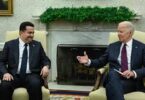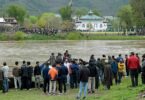F.P. Report
WASHINGTON: Secretary of State Antony J. Blinken will travel to New Delhi, India, July 27-28 to reaffirm the United States’ commitment to strengthening our partnership and underscore cooperation on our shared priorities. Secretary Blinken will meet with Prime Minister Narendra Modi and External Affairs Minister Dr. S. Jaishankar to discuss a wide range of issues, including continued cooperation on COVID-19 response efforts, Indo-Pacific engagement, shared regional security interests, shared democratic values, and addressing the climate crisis.
Deepening the U.S.-India Partnership
The United States and India have a strong strategic partnership founded on shared values and a commitment to a free and open Indo-Pacific region. The United States supports India’s emergence as a leading global power and vital partner in efforts to ensure that the Indo-Pacific is a region of peace, stability, and growing prosperity and economic inclusion.
The United States and India cooperate on a wide range of diplomatic, economic and security issues, including defense, non-proliferation, regional cooperation in the Indo-Pacific, shared democratic values, counterterrorism, climate change, health, energy, trade and investment, peacekeeping, the environment, education, science and technology, agriculture, space, and oceans.
In 2008, the United States and India signed an agreement, making India a full partner in the governance and funding of the Fulbright Program. An increase in exchanges under the agreement has allowed for the development of new and innovative programs, and India now has the largest Fulbright Scholar (faculty) program in the world. In FY 2019, this funding provided opportunities for 61 U.S. Scholars, 66 Indian Scholars, 80 U.S. students, including 29 English Teaching Assistants, and 55 Indian students, including 13 Foreign Language Teaching Assistants.
The United States and India are working to expand cooperation in international organizations. The United States welcomed India joining the UN Security Council in January 2021 for a two-year term.
In October 2020, India hosted the third 2+2 Ministerial Dialogue, and the United States looks forward to the next 2+2 later this year.
The Indo-Pacific Front and Center
India is a leading global power and a key U.S. partner in the Indo-Pacific and beyond. At the inaugural Quad Leaders’ Summit in March, President Biden and Prime Minister Modi joined their Japanese and Australian counterparts in pledging to respond to the economic and health impacts of COVID-19, combat the climate crisis, and address shared challenges, including in cyber-space, critical technologies, counterterrorism, quality infrastructure investment, humanitarian assistance and disaster relief, and maritime security.
Deterring Our Adversaries and Defending Our Interests
U.S.-India defense cooperation is reaching new heights, including through information sharing, liaison officers, increasingly complex exercises like Malabar, and defense enabling agreements, such as the secure communications agreement COMCASA. As of 2020, the United States has authorized over $20 billion in defense sales to India.
Through the U.S.-India Defense Technology and Trade Initiative, the United States and India work together on co-production and co-development of defense equipment.
The United States and India are also closely coordinating on regional security issues, such as Afghanistan.
Combating the Covid-19 Pandemic
The United States stands with the people of India as they continue to battle the COVID-19 pandemic. The United States has contributed more than $200 million for India’s COVID-19 relief and response efforts since the pandemic began, including more than $50 million in emergency supplies and training for more than 218,000 frontline health workers on infection prevention and control, benefitting more than 43 million Indians.
Earlier this year, the United States and India initiated renewal of a memorandum of understanding to collaborate through an International Center of Excellence in Research focused on infectious diseases, including COVID-19 and other emerging threats.
The United States and India are partnering to strengthen the global response to COVID-19, on issues ranging from addressing infectious disease outbreaks to strengthening health systems to securing global supply chains.
U.S. pharmaceutical companies have coordinated with Indian companies since the beginning of the pandemic. This cooperation includes voluntary licensing and technology transfer agreements to increase global manufacturing capacity for COVID-19 vaccines, therapies, and conducting clinical trials.
Tackling the Climate Crisis
U.S. Special Presidential Envoy for Climate John Kerry traveled to India in April of this year and met with Indian Prime Minister Narendra Modi. They discussed the importance of two of the world’s largest economies leading together to address the climate crisis.
At the Leaders’ Summit on Climate in April, President Biden and Prime Minister Modi launched the U.S.-India Climate and Clean Energy Agenda 2030 Partnership to strengthen cooperation on strong actions in the current decade to meet the goals of the Paris Agreement and to help each country achieve its respective climate and clean energy goals.
Under the new Agenda 2030 Partnership, the United States and India look forward to launching the new Climate Action and Finance Mobilization Dialogue, led by Special Presidential Envoy for Climate John Kerry, and relaunching the Strategic Clean Energy Partnership, led by Secretary of Energy Jennifer Granholm, later this year.
The United States looks forward to further cooperation with India on tackling the climate crisis and raising global ambition ahead of the 26th UN Climate Change Conference of the Parties (COP26) in Glasgow, UK, in November.






